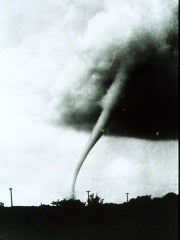 This post is by Lisa Moore, Ph.D., a scientist in the Climate and Air program at Environmental Defense.
This post is by Lisa Moore, Ph.D., a scientist in the Climate and Air program at Environmental Defense.
 Yesterday, an unusually ferocious winter tornado system killed at least 55 people in five Southern states, and destroyed over a thousand homes and businesses. Usually tornadoes touch down for 20 minutes then come back up, but these were rare "long-track" tornadoes that stayed on the ground for 30 to 50 miles.
Yesterday, an unusually ferocious winter tornado system killed at least 55 people in five Southern states, and destroyed over a thousand homes and businesses. Usually tornadoes touch down for 20 minutes then come back up, but these were rare "long-track" tornadoes that stayed on the ground for 30 to 50 miles.
Lots of recent research indicates that global warming increases the intensity of hurricanes. Could it also affect tornadoes? It’s too early to tell, but scientists are starting to look.
The relationship between global warming and tornadoes is a very new area of research. The IPCC’s Fourth Assessment Report says that there is "insufficient evidence" of any changes in "small scale phenomena such as tornadoes, hail, lightning and dust-storms." So there’s no trend, but a recent study by NASA found that "the most violent severe storms and tornadoes may become more common as Earth’s climate warms."
Tornadoes are formed when warm and cold air come together, and according to the Weather Underground, yesterday’s tornado outbreak was fueled by unusually warm weather. That’s not definitive, of course, since no single weather event can be ascribed to global warming, but it makes you wonder. I’m glad scientists are starting to investigate.










3 Comments
It’s good that scientists are looking at the relation between tornadoes and climate warming, but in my 32 years as a meterologist, I can’t see any increase in frequency or intensity of tornadoes THUS FAR. That’s not to say there won’t be an obvious increase in the next decades, but, although I’m not a climatologist per se, I do look at weather records each day and so far find worse tornadoes and outbreaks in the past, such as in 1953 and 1974. Global warming is occurring, but in my opinion, the real effects won’t be seen for quite a few years.
Here’s the NWS Storm Prediction Center’s list of the 25 deadliest tornadoes and you’ll see ALL were BEFORE 1956 with some of the deadliest in the 1800s! Here’s that link:
http://www.spc.noaa.gov/faq/tornado/killers.html
Here’s the list:
RANK, DATE, AREA, DEATHS
1 – 18 Mar 1925 – Tri-State (MO/IL/IN) – 695
2 – 06 May 1840 – Natchez MS – 317
3 – 27 May 1896 – St. Louis MO – 255
4 – 05 Apr 1936 – Tupelo MS – 216
5 – 06 Apr 1936 – Gainesville GA – 203
6 – 09 Apr 1947 – Woodward OK – 181
7 – 24 Apr 1908 – Amite LA, Purvis MS – 143
8 – 12 Jun 1899 – New Richmond WI – 117
9 – 8 Jun 1953 – Flint MI – 115
10 – 11 May 1953 – Waco TX – 114
10 – 18 May 1902 – Goliad TX – 114 (tie)
12 – 23 Mar 1913 – Omaha NE – 103
13 – 26 May 1917 – Mattoon IL – 101
14 – 23 Jun 1944 – Shinnston WV – 100
15 – 18 Apr 1880 – Marshfield MO – 99
16 – 01 Jun 1903 – Gainesville, Holland GA – 98
16 – 09 May 1927 – Poplar Bluff MO – 98
18 – 10 May 1905 – Snyder OK – 97
19 – 24 Apr 1908 – Natchez MS – 91
20 – 09 Jun 1953 – Worcester MA – 90
21 – 20 Apr 1920 – Starkville MS, Waco AL – 88
22 – 28 Jun 1924 – Lorain, Sandusky OH – 85
23 – 25 May 1955 – Udall KS – 80
24 – 29 Sep 1927 – St. Louis MO – 79
25 – 27 Mar 1890 – Louisville KY – 76
Historic Tornadoes and dates:
http://www.spc.noaa.gov/faq/tornado/#History
Like I said, I just try to always look at past weather before making judgement on whether or not G.Warming is having an effect YET.
Ken
Here’s a list of F5 tornadoes over the years….the strongest tornades, also from SPC:
http://www.spc.noaa.gov/faq/tornado/f5torns.html
Since I don’t want to see a drastic increase of tornadoes in the future, that’s even more reason to start some kind of emissions caps so we don’t add to the problem.
Valuable information and excellent design you got here! I would like to thank you for sharing your thoughts and time into the stuff you post!! Thumbs up